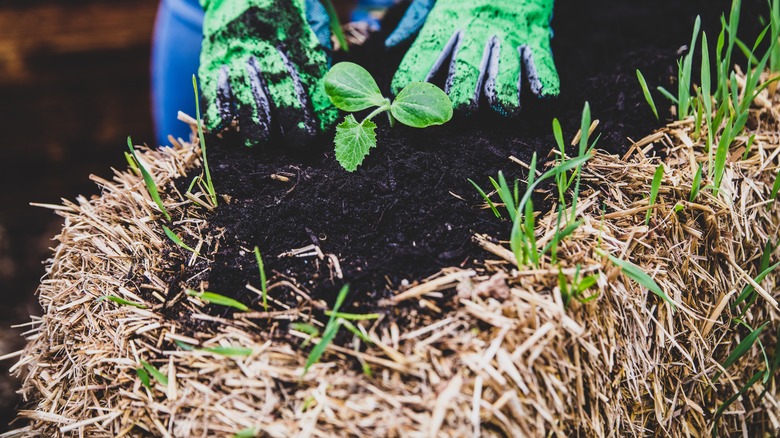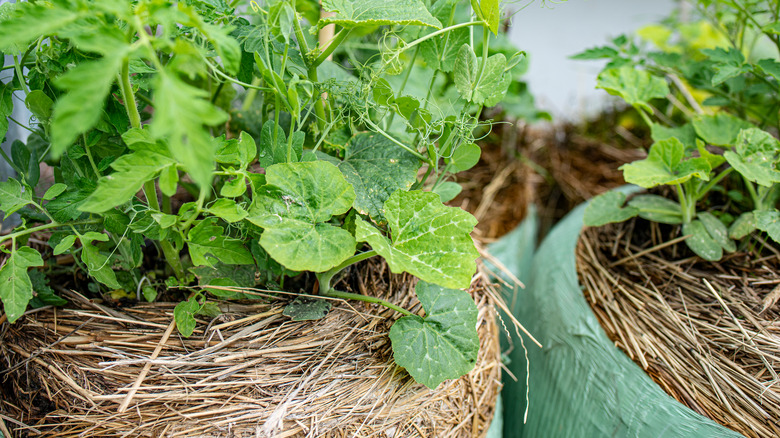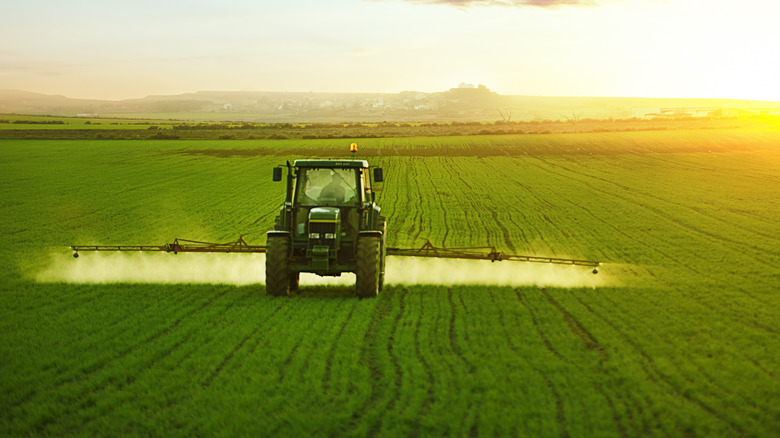The Biggest Mistake People Make When Starting A Straw Bale Garden
Straw bale gardening has become a recent fad in the gardening world. Its appeal comes from the fact that you're essentially growing your food in compostable material, which can make your garden more sustainable. It's a more temporary alternative to traditional raised beds made from wood. However, a crucial straw bale mistake many gardeners make is sourcing non-organic straw. Most straw is heavily sprayed with herbicides, and it can be difficult to come across organic hay in the US. Straw bale gardening has many benefits: including the amount of nutrients and healthy bacteria they offer for your veggies after conditioning; none of that matters if your crops are being slowly poisoned with toxic chemicals.
Not everyone in the world of straw bale gardening knows this, and many people don't consider whether the straw they use was sprayed. Unfortunately, with non-organic straw, a great crop of veggies can be contaminated with pesticides — as well as the surrounding soil and areas of your garden. That's right. The chemicals can leach out of the straw bales as they decompose and contaminate your yard and garden. While straw bale gardening is a cool concept with lots of benefits, it is not something you want to roll the dice with when choosing organic or non-organic straw. However, there are still options you can take to have a great straw bale garden.
What is a straw bale garden?
A straw bale garden uses traditional farmer's straw as the primary growing medium. You are growing directly in the decomposing straw bale, which is naturally high in organic matter. However, before you can grow in it, Joel Karsten, avid gardener and author of "Straw Bale Gardening," explains how the bale must be conditioned before using it as a growing medium. This consists of adding nitrogen to the bale, like a blood meal mix or a natural fertilizer, to accelerate the decomposition process. Since the bale is high in carbon, it needs nitrogen to activate the healthy bacteria that break it down, making it an absolute feast for hungry veggies and plants. Furthermore, a recently decomposed straw has biological activity and bioavailability similar to a compost pile.
After adding the nitrogen to the bales, it's essential to water it in as moisture is also a key component for decomposition. Conditioning the bale makes a "green manure" pile – the perfect environment for growing food. Because this growing medium is so high in nutrients, many gardeners report having the most success with this specific gardening style compared to any other. It's not hard to see how this can be an absolute powerhouse for growing healthy, nutrient-rich veggies. Another added benefit is that it's less labor intensive than traditional gardening, which requires hoeing, weeding, digging, shoveling large piles of soil or compost, and more.
The biggest mistake you can make with straw bale gardening
Straw bale gardening sounds too good to be true, right? It is cheaper, easier, requires less commitment, and is much higher in nutrients and beneficial microbes and bacteria than your average gardening soil. However, many gardeners and farmers want to grow organic, chemical-free, nutrient-rich produce to feed themselves and their families. Well, if you're using non-organic, traditional farmer straw, you could inadvertently expose yourself and your family to unwanted pesticides and herbicides, which could destroy your garden for years to come.
Legally, farmers have to adhere to the label's instructions regarding herbicide usage and by-products. Most herbicides state that sprayed straw should not be sold for use as mulch or compost. However, management practices are hard to trace and prove. So, it's essential that you only purchase your straw from organic farmers who do not use any herbicide or pesticides on their straw. Unfortunately, since straw is made from some of the commonly sprayed crops in the US, much of it is contaminated with glyphosate. You can still safely implement straw bale gardening – it's entirely possible and presents many benefits for gardeners. However, just be sure that you are sourcing organic straw from trusted farmers.


